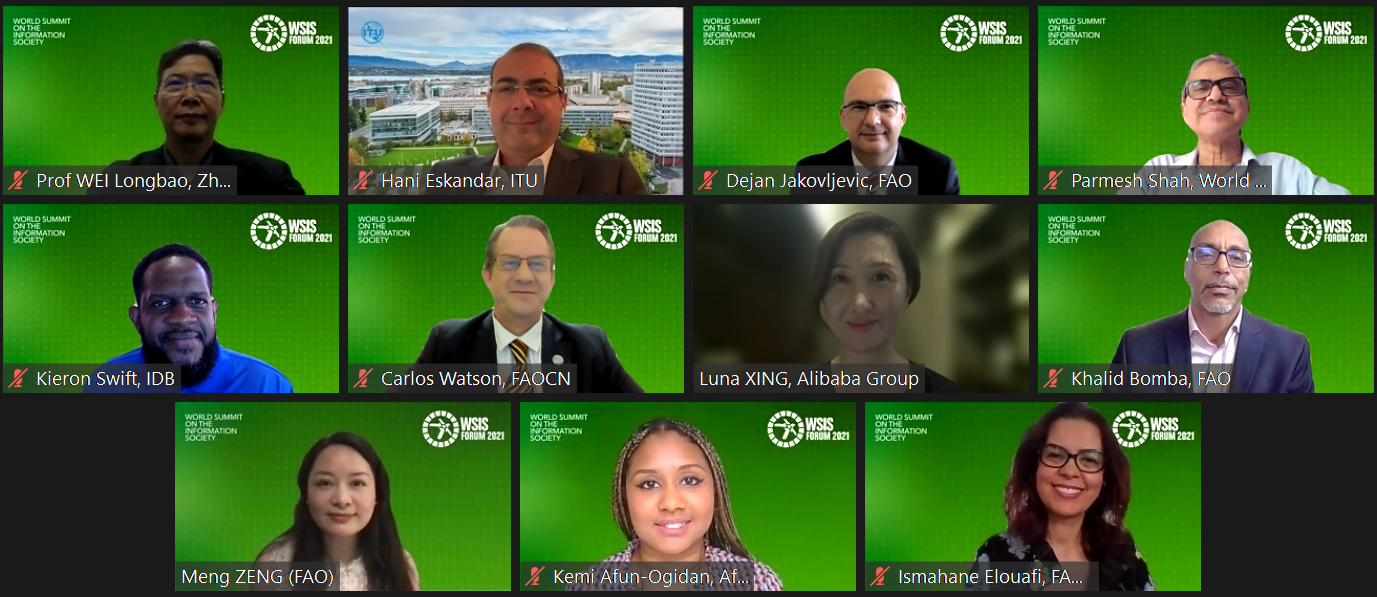WSIS Action Line C7: E-Agriculture
Food and Agriculture Organization of the United Nations, Zhejiang University, International Telecommunication Union
Session 260
E-commerce for Agriculture and Rural Development
The agricultural sector is going to face enormous challenges to feed the projected 9.6 billion people who will inhabit the planet by 2050, requiring a 60% increase in food production. The COVID-19 pandemic has resulted in severe economic and social distress around the world, including a global economic downturn on many industries and triggering several negative impacts on agri-food systems. However, e-commerce entered the outbreak period ahead of time, especially on agri-food sector and is considered as a potential solution to this difficult situation by the new opportunities it creates.
The innovative applications of digital technology are key to transform the food and agriculture sector, address the new emerging global challenges and achieve the SDGs in line with the WSIS Action Lines. Among many digital technologies related to development, e-commerce stands out and significantly fosters economic growth because it can instantly connect buyers and sellers, reduce transaction costs, avoid dealing face to face and create a new niche market tailored to the specific needs of the consumers. Online markets enable industrial products to reach rural areas and agricultural products to reach urban ones, breaking the barriers of factor mobility in both rural and urban areas, updating the production exchanges, increasing the income of farmers, and stimulating the agricultural supply-side structural reform. They have been the bellwether of economic development in rural areas, helping rural revitalization, and assisting impoverished areas in poverty relief through the supply of food production during the COVID-19 pandemic difficult times.
The development of rural e-commerce will effectively accelerate the pace of agricultural industrialization, facilitate the development of rural economy, and eventually raise awareness to e-agriculture to reduce the traditional agricultural transaction methods. Through a strong focus on digitalization and information, rural e-commerce cooperates with dense rural chains in the food systems through intensive management, market-oriented operations, and systemic cross-regional cross-industry alliances. The foreseen outcomes are to build a compact and orderly business consortium, reduce rural business costs, and expand the field of rural business, so that farmers can make the best benefit of the platform use.
This session will focus on how e-commerce impacts rural development positively in the new era of digital agriculture. During the WSIS session, a report will be specially released, which discusses how e-commerce is effectively and actively helping rural and agriculture progress, based on case studies of successful practices of Chinese private sectors. Experienced experts from the e-commerce sector will be invited to explore the impact of e-commerce in addressing the challenges which the agriculture and food sector must face to achieve SDG1 and SDG2.
Some successful projects relevant to the thematic focus of the session:
Fully aware of the incredible potential that e-commerce represents as a development and exponential growth tool for the wide range of stakeholders that engage in that process, FAO has been actively supporting the building of Digital Agriculture Innovation Hubs through the last years to foster innovation ecosystem and culture that support the development of e-agriculture and promote the development of e-commerce. The actions undertaken so far include: a partnership with Zhejiang University to hold a Digital Agriculture Forum and a Global AgriInno Challenge in December last year to enhance practice exchanges and empower young agripreneurs, and the yearly publication of a report to strengthen knowledge and expertise sharing in the digital agriculture sector. FAO's International Platform for Digital Food and Agriculture is another initiative created to bridge the gap between the existing international fora for food and agriculture, enhance awareness on issues specific to the digitalization of the food and agriculture sectors and provide policy recommendations to governments to support decision-making at higher levels.
Vision for WSIS Beyond 2015, towards 2025:
WSIS Beyond 2021 should focus on establishing efficient mechanisms for coordination of multi-stakeholder implementation activities, information exchange, creation of knowledge, sharing of best practices and continue to provide assistance in developing multi-stakeholder and public/private partnerships to advance development goals. FAO's actions are aligned towards the same objectives.
Digital Agriculture Report: Rural E-commerce Development—Experience from China can be download from: http://www.fao.org/documents/card/en/c/cb4960en
AGENDA
• 15:00-15:02 Introduction
- ZENG Meng, Information Technology Officer, IT Services Division, FAO
• 15:02-15:10 Opening Speech and launch of digital agriculture report
- Ismahane Elouafi, Chief Scientist, FAO
• 15:10-15:25 Presentation on Digital Agriculture Report: Rural E-commerce -- experiences from China
- Dejan Jakovljevic, Director, IT Services Division, FAO
- WEI Longbao, Director, Institute of Food and Agribusiness Management, Zhejiang University
• 15:25-15:45 Panel discussion
Moderator: Carlos Watson, Representative to China and DPR Korea, FAO
- Parmesh Shah, Global Lead, Data Driven Digital Agriculture, World Bank Group
- Hani Eskandar, Senior Coordinator, Digital Services, ITU
- Olukemi AFUN-OGIDAN, Principal Agribusiness Officer, African Development Bank Group
- Luna Xing, Vice President, Alibaba Group
- Kieron Swift, Project Development Consultant, Inter-American Development Bank
- Mark Matovu, co-founder and CEO, Nampya Farmers Market (winner from Global AgriInno Challenge 2020)
• 15:45-15:55 Q&A
• 15:55-16:00 Closing remarks
- Khalid Bomba, Chief Innovation Officer, FAO
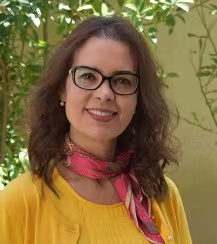
Dr. Ismahane Elouafi is currently the Chief Scientist at the Food and Agriculture Organization of the United Nations (FAO) and is a member of FAO’s core leadership team.
From 2012 until her appointment with FAO in November 2020, Dr. Elouafi was Director General at the International Center for Biosaline Agriculture (ICBA), headquartered in the United Arab Emirates.
Dr. Elouafi had previously held senior scientific and leadership positions, including Senior Advisor to the Assistant Deputy Minister, Agriculture and Agri-Food Canada Research Branch in Ottawa, Canada (2006-2007), and Manager then Director of Research Management and Partnerships Division at the Canadian Food Inspection Agency (2007-2012).
She also worked as a scientist with several international research organizations, including the International Center for Agricultural Research in the Dry Areas (ICARDA), Japan International Research Center for Agricultural Sciences (JIRCAS), and the International Maize and Wheat Improvement Center (CIMMYT).
Dr. Elouafi has been a member of various strategy expert panels and advisory groups, including the Global Commission on Adaptation and HarvestPlus.
She sat on several Board of Directors, including the International Food Policy Research Institute (IFPRI, 2015-2020), the Centre for Agriculture and Bioscience International (CABI, 2019-2020), and the CGIAR System Management Board (2020).
She is also a member of the Scientific Group for the 2021 UN Food Systems Summit.
Dr. Elouafi holds Master of Science in Genetics and Plant Breeding (1995) from the Hassan II Institute of Agronomy and Veterinary Medicine, Morocco, and a Ph.D. in Genetics (2001) from the University of Cordoba, Spain.

Dejan Jakovljevic is the Director of IT Services Division of the Food and Agriculture Organization of the United Nations, based in Rome, Italy. Mr. Jakovljevic has more than two decades of experience focusing on strategic aspects of IT, driving organizational modernization and transformation in the International Development domain. He is passionate about bringing digital capabilities and innovation into accelerating impact in support of Sustainable Development Goals. His previous experience includes IT leadership roles in South East Asia and European Region, with UNICEF and WHO.
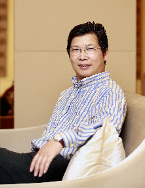.png)
Prof Wei is currently Qiushi chair professor of applied economics and agribusiness, deputy dean of China Academy for Rural Development, Zhejiang University. He is the former deputy dean of the School of Management, Zhejiang University in charge of MBA and EMBA programs. He has held several other positions at Zhejiang University, including director, Institute of Food & Agribusiness Management; and deputy director, National Key Research Base for Humanities and Social Science, Center for Agricultural and Rural Development (CARD). He has also been a fellow at the Weatherhead Center for International Affairs, Harvard University, adjunct professor at the University of Guelph in Canada, and has done work at Iowa State University. He has written widely on China's economic development, industrial clustering and urbanization, agricultural & food policy in China, and international agribusiness. Prof Wei was educated at Zhejiang University, from which he received his doctorate, master's, and bachelor's degrees. Prof Wei is a Fulbright scholar 2004~2005 academic year at Harvard University and currently a board member of the International Food and Agribusiness Management Association, IFAMA, he was elected IFAMA fellow of the year 2019.
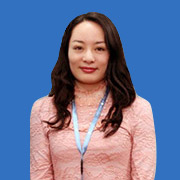
Ms. Meng ZENG is a Team Lead of Digital Agriculture and Innovation Hubs at IT Services (CSI) of FAO. She holds an MA in Sustainable International Development from Brandeis University. Before joining FAO in 2017, she worked as lead at UNDP in Digital Innovation and Poverty Reduction and at ILO in rural agribusiness and entrepreneurship, and capacity development. Her interests include entrepreneurship and innovation for youth and women, digital knowledge transferring, policy and strategy for the development of digital agriculture, and innovation solutions for Sustainable Development. She currently is leading on Digital Agriculture and Innovation Hubs to create enabling ecosystem and culture for agripreneurs to address development challenges through innovation and partnership. She is also supporting of the establishment of International Platform for Digital Food and Agriculture, aiming to promote discussion and strengthen linkages of international fora for agriculture and food, and provide policy recommendations and technical support to governments and other stakeholders to bridge digital gaps.
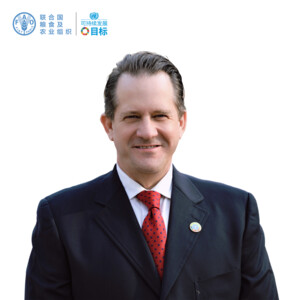
Mr Carlos Watson took up his assignment as the FAO Representative to the People’s Republic of China on 1 February, 2021.
He has been working in management, resource mobilization and international cooperation for the last 25 years. Having joined the Food and Agriculture Organization (FAO) of the United Nations in 2014, he led the South-South and Triangular Cooperation (SSTC) team to formulate and execute Resource Mobilization Strategies and SSTC Strategies as well as negotiate national Memorandum of Understanding (MoU) with Member States. Passionately committed to the Sustainable Development Goals (SDGs), especially ending hunger together, he was actively involved in an organization-wide effort in developing innovative mechanisms that enable private sector investment to apply an SDG lens to all activities.
Prior to joining the FAO, he was the Chief of Resource Mobilization of the International Cooperation and Partnership Department at the Central American Bank for Economic Integration (CABEI) in Tegucigalpa, Honduras, between 1995 and 2014. He was responsible for the financial relationships of the Bank and built successful partnerships with international banks, development agencies and governmental institutions, through which CABEI has been able to achieve many of its development commitments and benefit the people in the region.
Mr Watson, a national of Honduras, holds a Master’s Degree in Industrial and Administrative Sciences from the City University of London in the United Kingdom, and a Bachelor’s Degree in Industrial and Mechanical Engineering from the University of Bridgeport in the United States.
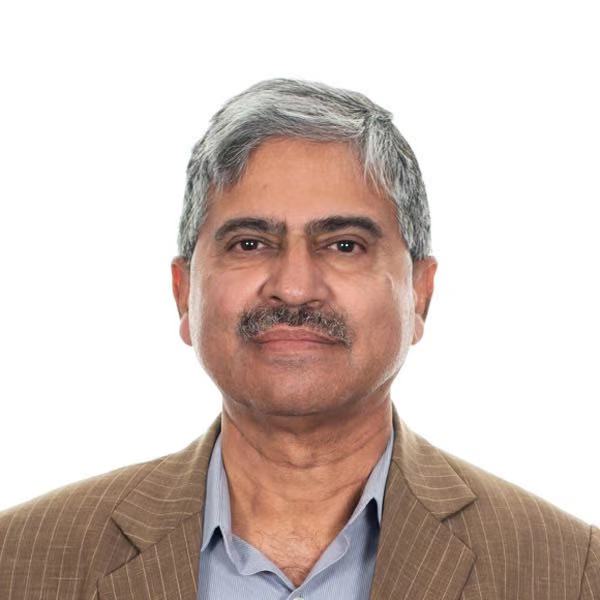
In this position he provides leadership to Bank’s work in these areas and supports development of global knowledge and learning in these areas to offer solutions to clients and other development partners. He also leads the rural livelihood and development cluster in South Asia region of the World Bank and is involved in designing and supporting a number of rural poverty reduction and inclusive growth programs in the region. His current areas of interest are economic and social organizations and networks of the poor, making markets and public services work for the poor, social entrepreneurship, ICT-based innovations in agriculture and rural development, promotion of on farm and off farm jobs and public private and people partnerships for rural poverty reduction.
Prior to his current position, Parmesh worked as Coordinator of the Bank wide Community of Practice on "Participation." In this role, he supported development of operational knowledge and learning across the Bank group on community driven development, community participation, participation in development of country-owned poverty reduction strategies and social accountability mechanisms.
Before joining the Bank, Parmesh worked for governments, civil society organizations, foundations and other bilateral and multilateral development organizations in Asia and Africa regions in the areas of community driven development, participatory approaches, institutional change and natural resources management.
He holds a D Phil in Development Studies from Institute of Development Studies at the University of Sussex, MBA from Indian Institute of Management, Ahmedabad and B Tech degree in Agricultural Engineering from Pantnagar in India.
He has authored a number of papers and publications and has co-edited the book Fertile Lands: Economic and Environmental Impacts of Participatory Watershed Development Programs. ( IT Publications)
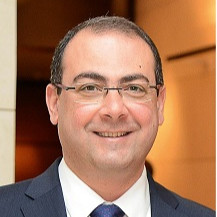
Mr. Eskandar is the ICT Applications Coordinator at the ICT Applications and Cybersecurity Division of the Telecommunication Development Bureau of ITU. Mr. Eskandar is currently involved in providing assistance to several developing countries by advising on eApplications strategies and policies, assisting in implementing technical co-operation projects in areas of digital health, agriculture, governance and education. He has lead the development of several guidelines and best-practices reports on eApplications.
Previously, Mr. Eskandar had extensive experience in the field of ICT for Development where he, through working with the International Federation of Red Cross and Red Crescent in Switzerland and, UNDP and other NGOs in Egypt, was involved in several development projects in the fields of Health, Education, Illiteracy Eradication, Community Development, SME development and Micro Credits. This included, among others, introducing Telemedicine services in rural areas, introducing ICT in Schools, creating Community Development Portals, Community Learning Centres, developing e-Learning and training programs for Youth.
Mr. Eskandar has an educational background in Electrical Engineering (Telecommunications) and has completed an MBA from McGill University, Canada and a Master Degree in Social and Economic Development Studies from University of Paris I, France.

Kemi Afun-Ogidan is a Principal Agribusiness Officer and Coordinator of the Digital Agriculture Flagship at the African Development Bank. She has a background in agribusiness policy advisory and public and private sector agribusiness investments. Kemi has worked on multiple portfolios including private sector financing, agribusiness and sustainable investments, strategy and public sector advisory in Africa. In her current role, she designs agriculture value chain projects and also coordinates the Bank's interventions to scale the adoption of digital technologies and data-driven solutions in the agriculture sector in Africa. She previously worked as a Policy Officer at the European Centre for Development Policy Management in the Netherlands. She has a master’s in Public Policy and Human Development from Maastricht University, in the Netherlands.

Luna Xing is currently acting as Vice President of Alibaba Group, primarily responsible for public affairs. Before current position, she was Deputy General Manager of Tmall Global, responsible for business strategy and public affairs of Tmall Import & Export, supported final implementation of globalization strategy of Alibaba Group in retail business. She served as Director of public affairs in Cainiao Network (Alibaba's logistics arm) before joining Tmall Global, and witnessed the growth of Cainiao Network from the initial startup to a rapid development stage of “driven by data and technology”. She was senior executive of Hong Kong Dragon Airlines Limited before joining Alibaba Group, successively acted key management positions as Chief Representative in Hong Kong and many other cities in mainland China. Many years of experience in traditional industry combining with working experience in Alibaba Group enabled her to have a thorough understanding and a deep look into the integrated development of the Internet and traditional industries, as well as the direction of the transformation and upgrading of traditional industries.
Luna holds a Master degree in management from Tongji University.
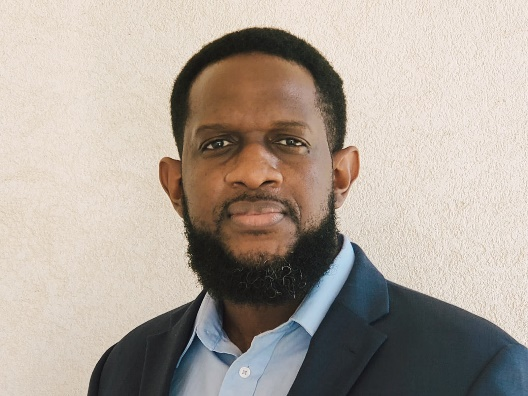
Kieron Swift is a Project Development Consultant at the Inter-American Development Bank (IDB). Dr Swift is a seasoned development consultant and innovation policy specialist with experience across the policy cycle and project life cycle in the domains of science, technology and innovation (STI), competitiveness, entrepreneurship, digital transformation and information and communication technologies for development (ICT4D). Over 18 years as a professional he blends project management, public policy, organizational change management and engineering expertise to generate results for a range of public and private sector organizations. He has a BSc in Electrical and Computer Engineering from the University of the West Indies, a MSc in Public Policies for Science, Technology and Innovation and a PhD in Science and Technology Policy Studies, both from the University of Sussex, UK.
Dr. Swift works with the Compete Caribbean Partnership Facility - a private sector development program that delivers innovative and practical solutions to stimulate economic growth, increase productivity and foster innovation and competitiveness. At Compete Caribbean, Dr Swift leads the identification, design, project preparation and management of a portfolio of technical assistance projects that are executed at either national or regional level across the 13 Compete Caribbean beneficiary countries. Most recently, this includes a Regional AgriTech Pilot Program that is providing grant funding to enable selected projects to test their technical and business model feasibility, environmental sustainability and potential scalability.
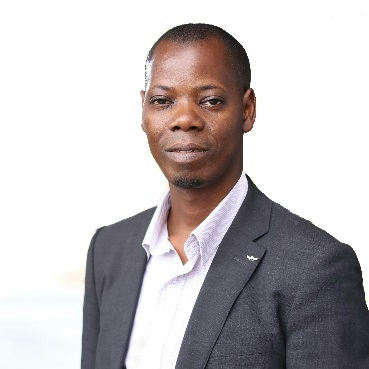
Mark Matovu is a Co-Founder and CEO of Nampya Farmers Market which is a mobile-based food distribution and logistics company connecting rural smallholder farmers with the informal retail food vendors in cities in a bid to create an efficient, transparent and formal agri-food marketplace.
Mark left the family farm ten years ago to pursue a career in business and computing. Over the course of that decade, he launched a progressive ICT training startup in Uganda to provide basic ICT skills for human capital to his community. But, as they say, you can take the boy out of the country, nothing took the country out of Mark. Today, his path in business has led him right back to the farm, but in a different capacity. With expertise in Information systems Analysis, Logistics and supply chain space management, Mark is innovating the local food industry through creating deeper market penetration and distribution channels in the consumer food supply. He commits to interest in distribution and supply chain to bring economic opportunities to his country Uganda and Africa generally.

Khalid Bomba is the Director, Office of Innovation and Chief Innovation Officer at the Food and Agriculture Organization (FAO) of the UN. Prior to joining FAO, Khalid was the Founding Chief Executive Officer of the Ethiopian Agricultural Transformation Agency (ATA), an independent government agency tasked with catalyzing the transformation of Ethiopia’s agriculture sector. Prior to that, Khalid worked at the Bill & Melinda Gates Foundation where he developed and managed grants in the agriculture sector and served as the Regional Director for Africa at the Global eSchools and Communities Initiative, an organization founded by the United Nations ICT Task Force. Khalid has also held senior level and executive positions in other public and private sector institutions and began his career at JP Morgan, where he spent ten years as an investment banker working on mergers and acquisitions, corporate finance and sovereign debt issues. Khalid received his MSc from Oxford University and a second MSc from the London School of Economics in the United Kingdom and a BA from Swarthmore College in the United States.
-
 C7. ICT applications: benefits in all aspects of life — E-agriculture
C7. ICT applications: benefits in all aspects of life — E-agriculture
The session is closely connected to WSIS Action Line C7 which focuses on using ICT (information and communication technologies) applications for e-Agriculture. The rural e-commerce can be known as a business activity carried out through electronic data transmission technology, which can eliminate the time and space barriers to information transmission and exchange in traditional business activities, enhancing efficiency and effectiveness in delivery and value chains in agri-food systems. The development of rural e-commerce will effectively accelerate the pace of agricultural industrialization, facilitate the development of rural economy, and eventually enhance the global village´s awareness in reducing the traditional agricultural transaction methods and switch to more modern tools and techniques.
Agricultural industry suffers from decentralized production and management, weak competitiveness of products, high transaction cost and low degrees of standardization. How to establish a new market information circulation model with updated standards and an efficient circulation of agricultural products, has become a major practical problem to reduce the transaction cost of agricultural products, improve the overall income of agriculture, ensure the sustainable, stable and healthy development of agriculture and increase farmers' income. E-commerce may provide mature and advanced technical conditions that can contribute providing effective solutions to the above problems.
The session enhances the knowledge and practice exchanges by inviting experts in the field of e-commerce from various organizations, institutions, academics, private sector businesses, etc. to share their views on that important topic and by releasing a report based on the experiences of successful business models and results of technology applications in the field of e-commerce. It aims at promoting the development of global e-commerce for agricultural products in order to empower small and family farmers and improve the efficiency of distribution of the entire food system, from farm to table.
-
 Goal 1: End poverty in all its forms everywhere
Goal 1: End poverty in all its forms everywhere
-
 Goal 2: End hunger, achieve food security and improved nutrition and promote sustainable agriculture
Goal 2: End hunger, achieve food security and improved nutrition and promote sustainable agriculture
-
 Goal 8: Promote inclusive and sustainable economic growth, employment and decent work for all
Goal 8: Promote inclusive and sustainable economic growth, employment and decent work for all
-
 Goal 13: Take urgent action to combat climate change and its impacts
Goal 13: Take urgent action to combat climate change and its impacts
SDG 1: End poverty in all its forms everywhere
SDG 2: End hunger, achieve food security and improved nutrition and promote sustainable agriculture
SDG 8: Promote inclusive and sustainable economic growth, employment and decent work for all
SDG 13: Improve education, awareness-raising and human and institutional capacity on climate change mitigation, adaptation, impact reduction and early warning.
E-commerce is an important part of digital innovation. Digital innovation has the potential to transform the approach to all 17 SDGs. Specifically, the development of a strategic framework for digital innovation in the food and agriculture sector will provide a systematic process and sustainable business model for creating, testing, funding, and scaling new digital solutions to achieving the SDGs, particularly SDGs 1, 2, 8, and 13. Through this process, youth entrepreneurship, capacity development, and multi-stakeholder partnerships will be encouraged to enable a permanent and systematic change towards integrating digital technologies and innovation into local communities and national action plans. These activities contribute to SDGs 1,2 8, and 13 as well as establishing business models to produce new ideas and products aimed at contributing and achieving all the SDGs.
Digital Agriculture Forum 2020 link here
International Platform for Digital Food and Agriculture
164th Session of FAO Council on International Platform for Digital Food and Agriculture: http://www.fao.org/webcast/home/en/item/5330/icode/
Concept note: http://www.fao.org/3/ca7485en/ca7485en.pdf
http://www.fao.org/innovation/en/
http://www.fao.org/digital-agriculture/en/
http://www.fao.org/e-agriculture/home
Linkedin: Open call| LinkedIn
Twitter: Open call|Twitter
